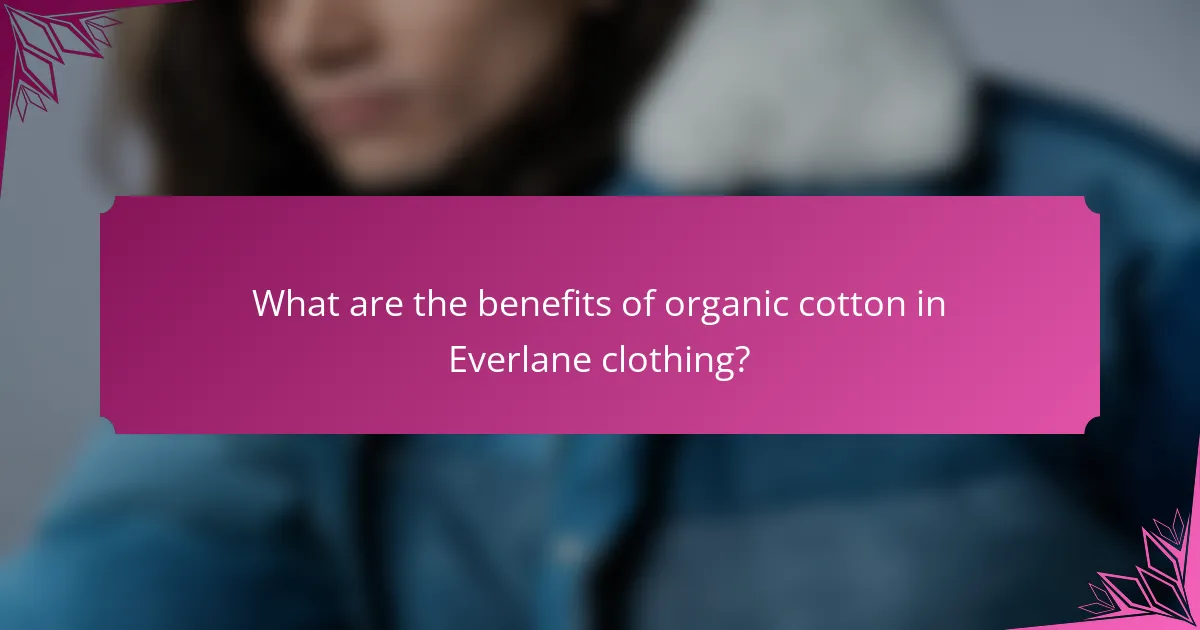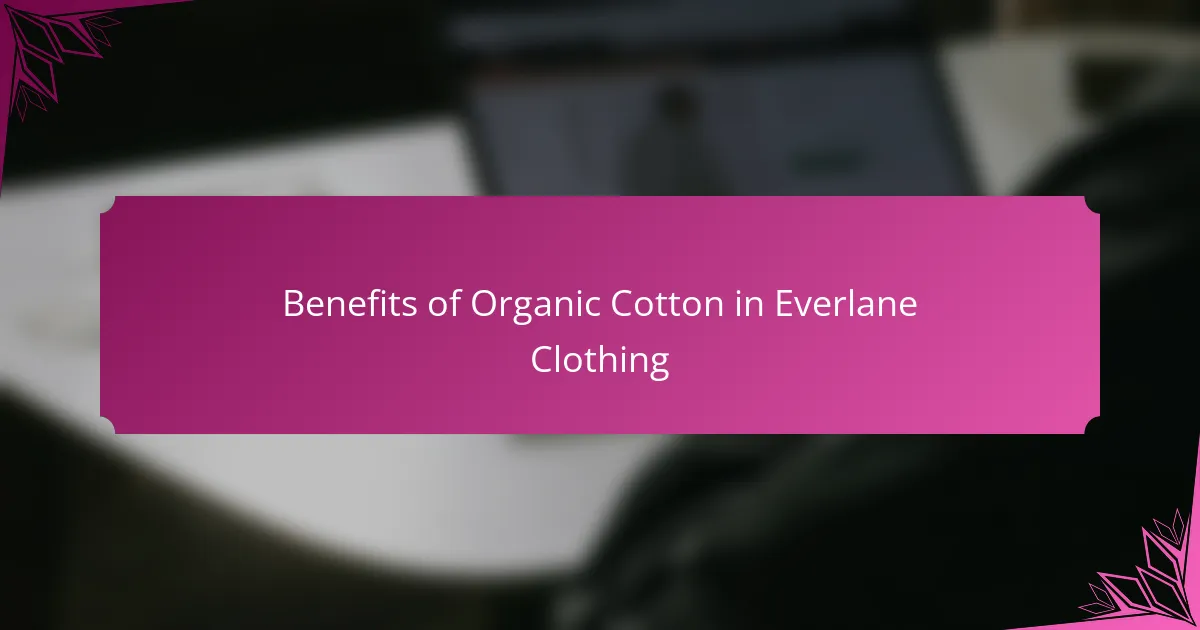Organic cotton is a key component in Everlane clothing, offering multiple advantages over conventional cotton. Grown without harmful pesticides and synthetic fertilizers, organic cotton supports healthier ecosystems and reduces chemical exposure for farmers. It is softer and more breathable, enhancing wearer comfort, and it also requires significantly less water—up to 91% less according to the Textile Exchange—compared to traditional cotton farming methods. Everlane’s commitment to sustainability includes sourcing organic cotton, aligning with the growing consumer demand for eco-friendly fashion choices while minimizing environmental impact.

What are the benefits of organic cotton in Everlane clothing?
Organic cotton in Everlane clothing offers several benefits. It is grown without harmful pesticides and synthetic fertilizers. This practice promotes healthier ecosystems and reduces chemical exposure for farmers. Organic cotton is also softer and more breathable than conventional cotton. This results in greater comfort for the wearer. Additionally, organic cotton farming uses less water compared to traditional methods. According to the Textile Exchange, organic cotton production can use up to 91% less water. Everlane’s commitment to sustainability includes sourcing organic cotton to minimize environmental impact. This aligns with consumer demand for eco-friendly fashion choices.
Why choose organic cotton over conventional cotton for clothing?
Organic cotton is a better choice than conventional cotton for clothing due to its environmental and health benefits. Organic cotton is grown without synthetic pesticides and fertilizers. This reduces chemical runoff into ecosystems. Conventional cotton farming often uses harmful chemicals that can affect soil and water quality.
Organic farming practices promote biodiversity and healthier soil. They help maintain a balanced ecosystem. Additionally, organic cotton is often softer and more breathable. This makes it more comfortable for wear.
Research indicates that organic cotton farming uses 91% less water than conventional methods. This is crucial in addressing water scarcity issues. Furthermore, organic cotton is less likely to cause skin irritations. This is beneficial for individuals with sensitive skin.
Choosing organic cotton supports sustainable agriculture and ethical labor practices. It often ensures better working conditions for farmers.
What environmental advantages does organic cotton provide?
Organic cotton reduces environmental impact through sustainable farming practices. It uses less water compared to conventional cotton, which can require up to 20,000 liters per kilogram. Organic cotton farming avoids synthetic pesticides and fertilizers. This leads to healthier soil and biodiversity. The absence of harmful chemicals reduces pollution in surrounding ecosystems. Organic cotton also supports carbon sequestration, helping to mitigate climate change. Studies show that organic cotton can reduce greenhouse gas emissions by up to 46% compared to conventional methods. These advantages make organic cotton a more sustainable choice for the environment.
How does organic cotton impact health and skin sensitivity?
Organic cotton is less likely to cause skin irritation compared to conventional cotton. This is due to the absence of harmful chemicals and pesticides used in its cultivation. Organic farming practices promote the use of natural fertilizers and pest control methods. As a result, organic cotton is gentler on sensitive skin. Studies show that individuals with skin sensitivities often report fewer allergic reactions when using organic cotton products. Additionally, organic cotton is breathable and hypoallergenic, making it suitable for people with skin conditions. These attributes contribute to overall skin health and comfort.
What specific benefits does Everlane highlight about their organic cotton clothing?
Everlane highlights several specific benefits of their organic cotton clothing. First, they emphasize sustainability. Organic cotton is grown without synthetic pesticides or fertilizers. This practice reduces environmental impact compared to conventional cotton farming. Second, Everlane points out that organic cotton is softer and more breathable. This enhances comfort for the wearer. Third, they note that organic cotton supports better farming practices. It promotes healthier soil and biodiversity. Everlane also mentions that their organic cotton clothing is produced in ethical factories. This ensures fair labor practices for workers. Overall, these benefits reflect Everlane’s commitment to sustainability and ethical fashion.
How does Everlane’s commitment to sustainability influence their clothing line?
Everlane’s commitment to sustainability significantly influences their clothing line by prioritizing eco-friendly materials and ethical production practices. The brand focuses on using organic cotton, which reduces the environmental impact associated with conventional cotton farming. Organic cotton is grown without harmful pesticides and synthetic fertilizers, promoting healthier soil and ecosystems. Additionally, Everlane practices transparent pricing and sourcing, allowing consumers to understand the true cost of their clothing. This approach not only supports sustainable farming but also empowers workers in the supply chain. Everlane’s dedication to sustainability is evident in their product offerings, which include a range of essentials made from organic cotton. This commitment attracts environmentally conscious consumers who value ethical fashion choices.
What certifications does Everlane’s organic cotton have?
Everlane’s organic cotton is certified by the Global Organic Textile Standard (GOTS). This certification ensures that the cotton is produced without harmful chemicals and adheres to strict environmental and social criteria. Additionally, Everlane’s organic cotton is certified by the OEKO-TEX Standard 100. This certification verifies that the cotton is free from harmful substances and safe for human use. These certifications demonstrate Everlane’s commitment to sustainable and ethical practices in their clothing production.
How does organic cotton contribute to the overall quality of Everlane clothing?
Organic cotton enhances the overall quality of Everlane clothing through its sustainability and durability. This fabric is grown without synthetic pesticides and fertilizers, making it environmentally friendly. The absence of harmful chemicals results in softer and hypoallergenic materials. Organic cotton is also known for its breathability, which improves comfort. Additionally, it is more durable than conventional cotton, leading to longer-lasting garments. Everlane sources its organic cotton from certified farms, ensuring high standards of quality. This commitment reflects the brand’s dedication to ethical fashion. Overall, organic cotton significantly elevates the quality and sustainability of Everlane’s apparel.
What are the durability and longevity aspects of organic cotton garments?
Organic cotton garments are known for their durability and longevity. These garments are made from fibers that are stronger than conventional cotton. The absence of harmful chemicals in organic farming enhances the integrity of the fibers. This results in garments that withstand wear and tear better over time.
Research indicates that organic cotton can last longer due to its natural resistance to pests and diseases. The cultivation methods used in organic farming contribute to healthier plants. Healthier plants produce stronger fibers, which translates to more durable textiles.
In addition, organic cotton garments tend to maintain their shape and color after multiple washes. This quality is attributed to the lack of synthetic dyes and treatments. Overall, the durability and longevity of organic cotton garments make them a sustainable choice for consumers.
How does the softness of organic cotton enhance comfort in clothing?
The softness of organic cotton significantly enhances comfort in clothing. Organic cotton fibers are finer and smoother compared to conventional cotton. This results in a softer texture against the skin. Softness reduces friction, preventing irritation during wear. Additionally, organic cotton is breathable, allowing air circulation. This breathability contributes to a comfortable temperature regulation. Studies show that softer fabrics lead to higher satisfaction in wearability. Therefore, the softness of organic cotton is a key factor in overall comfort in clothing.
What are the economic implications of using organic cotton in Everlane clothing?
The economic implications of using organic cotton in Everlane clothing include higher production costs and potential price increases for consumers. Organic cotton farming typically requires more labor and sustainable practices, which can elevate costs. Everlane, as a transparent brand, communicates these costs to consumers, promoting awareness of sustainable fashion.
Investing in organic cotton can also enhance brand reputation and customer loyalty. Studies show that consumers are increasingly willing to pay a premium for sustainable products. This trend can lead to increased sales over time.
Moreover, using organic cotton can reduce long-term costs associated with environmental damage and health issues from conventional cotton farming. Overall, the economic implications reflect a balance between higher initial costs and potential long-term benefits for both the brand and consumers.
How does the cost of organic cotton compare to conventional options?
Organic cotton generally costs more than conventional cotton. This price difference arises due to several factors. Organic farming practices are more labor-intensive. They avoid synthetic pesticides and fertilizers, which can increase costs. According to a report by the Organic Trade Association, organic cotton can be 20-50% more expensive than conventional cotton. This is due to the higher production costs and lower yields associated with organic farming. Additionally, organic certification processes add to the overall expenses. However, consumers often perceive organic cotton as a premium product, which can justify the higher price.
What is the impact of consumer demand for organic cotton on the market?
Consumer demand for organic cotton significantly influences the market by driving growth in sustainable fashion. This demand leads to increased production of organic cotton, which is often more costly than conventional cotton. As a result, brands are incentivized to adopt sustainable practices to meet consumer preferences. Research indicates that the global organic cotton market is projected to grow at a CAGR of 10.2% from 2021 to 2028. Additionally, consumers are willing to pay a premium for organic products, further encouraging brands to invest in organic cotton sourcing. This shift not only benefits the environment but also promotes ethical labor practices. Overall, rising consumer demand for organic cotton shapes industry standards and fosters innovation in sustainable textile production.
How can consumers make informed choices about organic cotton clothing?
Consumers can make informed choices about organic cotton clothing by researching certifications and understanding labeling. Look for certifications such as GOTS (Global Organic Textile Standard) and OEKO-TEX. These indicate adherence to organic farming practices and safe chemical use. Consumers should also examine the supply chain transparency of brands. Brands that disclose sourcing and production practices provide more reliable information. Additionally, reading customer reviews can offer insights into product quality and comfort. Researching the environmental impact of organic cotton compared to conventional cotton can further inform choices. Organic cotton typically uses less water and avoids harmful pesticides. This information supports the benefits of opting for organic cotton clothing.
What should consumers look for when selecting organic cotton garments?
Consumers should look for certifications when selecting organic cotton garments. Certifications like GOTS (Global Organic Textile Standard) ensure the cotton is truly organic. They should also check for transparency in sourcing. This includes knowing where and how the cotton is grown. Additionally, consumers should consider the fabric’s feel and durability. Organic cotton is typically softer and more breathable than conventional cotton. Lastly, consumers should look for brands that practice ethical labor standards. This ensures fair treatment of workers in the supply chain.
How can consumers support brands like Everlane that prioritize sustainability?
Consumers can support brands like Everlane that prioritize sustainability by choosing to purchase their products. Everlane focuses on transparency in pricing and sourcing, which appeals to eco-conscious consumers. By buying from these brands, consumers encourage sustainable practices in the fashion industry. Supporting such brands helps increase demand for organic materials, like organic cotton. Organic cotton reduces pesticide use, benefiting the environment. Additionally, consumers can share their support on social media, raising awareness about sustainable fashion. Engaging in conversations about sustainability can influence others to make eco-friendly choices. Overall, consumer choices directly impact the growth of sustainable brands.
The main entity of this article is organic cotton in Everlane clothing. The article outlines the numerous benefits of organic cotton, including its environmental advantages such as reduced pesticide use, lower water consumption, and support for biodiversity. It highlights the health benefits for consumers, particularly those with sensitive skin, and emphasizes Everlane’s commitment to sustainability through ethical sourcing and production practices. Additionally, the article discusses the economic implications of organic cotton, including its higher cost compared to conventional cotton and the impact of consumer demand on market trends.




